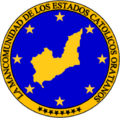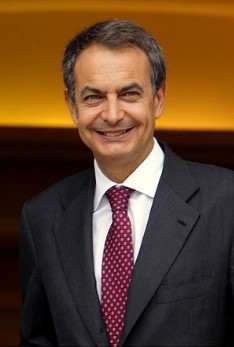Premier of Auratia
| Prime Minister of Auratia | |
|---|---|
| Primer Ministro de Oratia | |
 Great Seal of Auratia | |
| Government of Auratia Auratian Senate | |
| Style | Prime Minister (informal) Excelentísimo Señor (The Most Excellent) |
| Status | Head of Government |
| Member of | |
| Reports to | Auratian Senate and the President |
| Residence | Casa Isla Nobla |
| Seat | César Palace |
| Appointer | President of Auratia By convention, the president appoints based on ability to command confidence in the Assembly of the People. |
| Term length | At the pleasure of the president, or four years The prime minister serves while commanding the confidence of the majority of the Assembly of the People. The office has no term limits. |
| Constituting instrument | Treaty of Puerto del Rey (constitution) |
| Inaugural holder | Don Joaquín Ramón Dobrique |
| Formation | 13 January 1820 |
| Salary | $133,290 per annum |
The prime minister of Auratia, formally the Prime Minister of the Commonwealth of Auratian Catholic States (Auratian: el Primer Ministro de la Mancomunidad de los Estados Católicos Oratianos), is the head of government of Auratia. The prime minister is the chairman of the Commonwealth Cabinet. He is sixth in the Auratian order of precedence.
The prime minister is appointed by the president of Auratia, the head of state, and must normally be a member of either house of the Auratian Senate. Although in theory the president may choose whomever he wishes to serve as prime minister, convention holds that the president should appoint the leader of the largest political party or coalition in the Assembly of the People. The prime minister serves at the pleasure of the president, and he and his cabinet must enjoy the confidence of the Assembly.
The office of prime minister existed in various forms during the Kingdom of Auratia, and its powers varied depending on the whims of the monarch. After the Alzamiento and the overthrow of the monarchy, the office was formally establihed by the Treaty of Puerto del Rey, the nation's constitution, in January 1820.
As the chief advisor to the president, the prime minister is responsible for assisting the president in the execution of his executive authority. As the nation's foremost political leader, the prime minister is responsible for managing the business of the executive and legislature.The prime minister is the ex officio chairman of the Auraitan Economic Cooperative and the Auratian National Security Council. He is the most powerful person in Auratia.
The prime minister's residence and secondary office space is the Casa Isla Nobla in Cienflores. The prime minister's primary offices are located in César Palace, the nation's capitol.
The incumbent prime minister is Germán del Caserío, leader of the Sotirian Federation. He has held the office since 17 June 2013.
History
Although the office of the prime minister was formally established by the Treaty of Puerto del Rey, the nation's constituting document, the office did exist from time to time during the Kingdom of Auratia. The Cristiano Kings, the monarchs of Auratia, appointed members of the royal court, typically noblemen of high standing but not royals per se, to head up the nation's civil administrations. These officeholders were called various things, among them "prime minister."
In 1804, Alfonso II of Auratia, a more progressive monarch, sought to quell republican dissent by giving his subjects the vote. During this time, the office of His Majesty's Prime Minister was officially ordained, lasting until 1820. The functions of that prime minister are very different from what the prime minister's functions today. For instance, the prime minister of the Kingdom was not accountable of the legislature, or usually even a member of it. Aside from being the head of the civil administration, the prime minister was meant to represent the views of the Monarch in the People's Assembly.
After the Alzamiento, Auratia's republican revolution that overthrew the countries Cristiano rulers, the office of prime minister was reorganized and reestablished in the Treaty of Puerto del Rey, the nation's constitution. Don Joaquín Ramón Dobrique, a former noblemen, was selected by President Enrico Pía as a compromise with monarchist factions in government.

Until the turn of the 20th century, the president was both officially and in practice the highest executive authority in Auratia. The prime minister was a representative of the president in the Auratian Senate and his closest advisor. While the president was well-known to the public, the prime minister was a relative unknown outside of political circles. This changed, however, with the investiture of Aleixo Alto, the nation's first prime minister of Iustian descent. Alto often acted decisively in his role, gaining national attention. The powers of the prime minister continued to grow, but the president was still the domineering political figure.
Héctor Alvear, prime minister and Rose Rebellion leader during the Great War, is widely considered Auratia's most powerful and influential prime minister. Alvear openly defied the abuses of President Emilio Pirineo and his attempts to install functionalists into power. When Alvear was ousted from power by a coup d'état orchestrated by Pirineo and the September Clan military junta, he went on to lead the resistence against functionalist rule as an exile in Etruria. Alvear and his supporters landed on the Auratian peninsula in 1932, overthrowing Pirineo's functionalist regime.
The abuses of Pirineo's presidency led to the passing of various constitutional amendments that, among other things, restricted the president's powers. Many of the president's actions, such as appointing ministers or authorizing military deployment, now require the countersignature of the prime minister or the approval of the Commonwealth Cabinet. The Great War effectively turned the president's office into a ceremonial position. The power to form executive positions and policy is now near-execively that of the prime minister and his cabinet.
Appointment and removal
The president of Auratia appoints a member of the Auratian Senate to the office of the prime minsiter. The appointment of the prime minister is, by law, the sole prerogative of the president and does not require explicit parliamentary approval; the president may elect to appoint any member of the Auratian Senate to the role. The Treaty of Puerto del Rey allows the president to, in exceptional circumstances, appoint a person who is not a member of the Senate, but this requires a special dispensation given by a two-thirds supermajority of both houses of the Senate. This special procedure was only attempted once, when President Emilio Pirineo attempted—unsuccessfully—to appoint September Clan leader Ramón Cortés to the office.
Although in theory the president may appoint any member of the Senate, custom and tradition dictate that the president should appoint the leader of the party or coalition holding a majority or a plurality of seats in the Assembly of the People, the lower house of the Senate. There has not been a prime minister from the Council of the States, the upper house, since the Great War. It is uncommon, though not unprecedented, for a prime minister to not be the leader of their party upon appointment. The most recent example of this is the investiture of Prime Minister Walter García in 2001. García was made party leader of the Sotirian Federation only after his investiture.
The prime minister has a term length of four years, which is the term of the Assembly of the People. Although the Treaty of Puerto del Rey is rather ambigious about the issue, it has become common practice to reappoint a prime minister after an electoral victory. However, the prime minister is still only considered to have served one term despite having been reappointed, unless the prime minister's terms are broken up by another prime minister holding the office in the interim. The prime minister has no official term limits, but it is very rare for a prime minister to serve more than three terms.
As the prime minister serves at the pleasure of the president, the president may elect to remove the prime minister at any time for any reason he sees fit. However, no president since the Great War has removed a prime minister for any reason other than losing the confidence of the Assembly.
Confidence of the Assembly
The prime minister and his cabinet must enjoy the confidence of a majority of the Assembly of the People in order to retain their offices. Motions of no confidence may not be instigated against the prime minister or specific ministers, but must be put forth against the entire Commonwealth Cabinet. If the Assembly of the People finds that it has no confidence in the prime minister, the president may either:
- Dissolve the Assembly of the People and schedule fresh elections, or;
- Dismiss the prime minsiter and his cabinet, and appoint a new prime minister who can command the Assembly's confidence.
Prime ministers typically advocate for the former option, but the president is not required to heed the prime minister's advice. The last prime minister to lose a confidence vote was José Maria Lindi in 1981. Lindi advised President José Lopez-Cruz to dissolve the Assembly in hopes of winning support in an election. President Lopez-Cruz refused Lindi's request and removed him from office.
